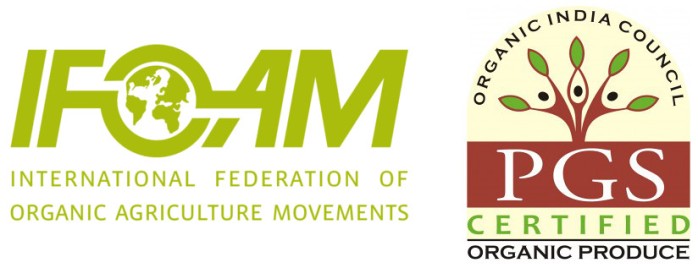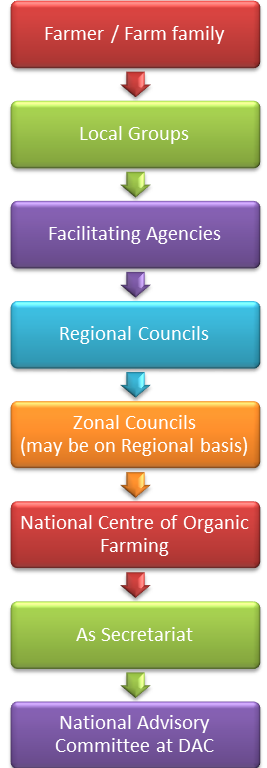The world is turning healthy. Yes, you heard that right. Isn’t that so good to hear? Eating healthy, going green, turning brown- all these phrases ring a bell in our heads. Can you imagine your skin glowing, no pimples, and hair soft and healthy? Wheeep, sounds awesome, right? THEN BUY ORGANIC!!!!!!
There is more than one reason why the organic movement is gaining its importance in the modern era. The first and foremost reason could be the letdown created by the conventional agriculture – undiscerning usage of chemicals causing air, water and soil pollution, health menaces, increase in pest and disease incidence, loss of crop diversity, untenable productivity and so on. On the other hand, lure towards organic foods started slowly by the health conscious urban community, which is visible among other section of our society. In addition, more number of farmers is showing inclination towards organic farming owing to remarkable efforts being taken up by both government and non-government organizations. All these happenings during the recent years helped in opening new walks for organic foods in the domestic as well as in international markets. General opinion among the consumers is that organic foods are nutritious, tasty, long shelf life and safe. In order to protect the demand and interests of the consumers the process of certification has become inescapable for organic consumer goods including organic foods, cosmetics, medicines, fabrics, etc. Already such initiatives are operating and there are different mechanisms, systems and agencies for certification of organic goods. PGS is one of these systems being initiated in different parts of the world, especially for small organic farmers who can produce organic foods for domestic market. In India PGS is being initiated by different organizations through OFAI and during 2011 PGS has seen launched by the Government of India, heralding its official recognition.
 PARTICIPATORY GUARANTEE SYSTEM
PARTICIPATORY GUARANTEE SYSTEM
WHAT IS PGS?
Participatory Guarantee System (PGS) is a quality assurance initiative that is locally relevant, emphasize the participation of stakeholders, including producers and consumers and operate outside the frame of third party certification. As per IFOAM (2008) definition “Participatory Guarantee Systems are locally focused quality assurance systems. They certify producers based on active participation of stakeholders and are built on a foundation of trust, social networks and knowledge exchange”. PGS is a process in which people in similar situations (in this case small holder producers) assess, inspect and verify the production practices of each other and collectively declare the entire holding of the group as organic.
PGS enable the direct participation of producers, consumers and other stakeholders in:
- The choice and definition of the standards
- The development and implementation of certification procedures
- The certification decisions
Participatory Guarantee Systems are also referred to as “participatory certification”.
The International Federation of Organic Agriculture Movements (IFOAM) and the organic movement remain a leader in the concept of PGS at the international level. IFOAM is running a program to recognize PGS in the organic sector. PGS is a tool that can be adopted not only for organic agriculture but is useful in various sectors.
Guiding Principles for Organic Participatory Guarantee System
In tune with the international trends and IFOAM’s PGS Guidelines, PGS India system is also based on participatory approach, a shared vision, transparency and trust. In addition it gives PGS movement a National recognition and institutional structure without affecting the spirit of PGS. The guiding principles are:
- Participation
- Shared Vision
- Transparency
- Trust
- Horizontality
Operational Structure
Schematic operational structure of the PGS India is given below:
Advantages of PGS over third party certification system
What is third party certification?
It is an organic guarantee programme operated under National Programme on Organic Production involving an independent agency for verification and certification of organic production processes.
Comparison
| Participatory Guarantee Scheme (PGS) | Third Party certification |
| Less paperwork | Heavy documentation by farmers and certifying agencies |
| Certification is for the whole farm | Certification is for single commodity or product |
| Individual farmers own their PGS certificates | The certificate is owned by the farmers’ group, NGO or the export company |
| More commitment and responsibility of farmers in certification process (including inspections and consequences) | Responsibility is with the third party certifying agency (including inspection and consequence like fine or license cancellation) |
| More leeway for farmers in the marketplace | Farmers are bound to sell only certified products and through certified group |
| It is free for farmers in group of five or more | It is expensive; inspection visits alone cost around Rs. 20,000 |
However, along with the various positives come a few shortcomings which are as follows.
Limitations of PGS
PGS certification is only for farmers or communities that can organize and perform as a group within the village or in close-by villages with continuous territory and is applicable on, on-farm activities comprising of crop production, processing and livestock rearing (including bee keeping) and off-farm processing “by PGS farmers of their direct products”.
Individual farmers or group of farmers having less than 5 members are not covered under PGS. They either have to opt for third party certification or join the existing PGS local group.
PGS is applicable on on-farm activities comprising of crop production, processing and livestock rearing and off-farm processing “by PGS farmers of their direct products”. Off-farm processing activities such as, storage, transport and value addition activities by persons/agencies other than PGS farmers away from the group are not covered under PGS. Off-farm input approval granted by the group is applicable on the members of the same group and cannot be taken as a basis for universal approval for other groups. Off-farm inputs need to be approved by each group for their member’s use on case to case basis.
PGS ensures traceability only up to end till it is in the custody of PGS group. Once the product leaves the custody of PGS group there is no control of PGS on its integrity, Therefore PGS is ideal for local direct sales/ direct trade between producer and consumer and direct trade of packed finished product with PGS logo between PGS group and traders/ retailers. But Local Groups and buyers in consultation with RC can devise some mechanism with full traceability records to allow use of PGS logo on products packed by traders/ retailers.
In conclusion it could be stated that there is a tremendous scope for PGS in the country and for local groups to coordinate with the national level system and national council.
Blog contributed by Akanksha Khurana, Class XII, New Delhi
– – – – – – – – – – – – – – – – – – – – – – – – – – – – – – – – – – – – – – – – – – – – – – – – – – – – – – – – –
Jeevanksh.com is committed to improve the livelihood of small & marginal organic farmers. We have tie-up with NGOs/farmer communities/manufacturers to supply us products produced locally. We practice fair trade, to help the farmers live a sustainable life and get the true value of their produce. We take utmost care to check and maintain the quality of the products available in our store.
Visit us to be a part of the growing community of health and environment conscious people.

